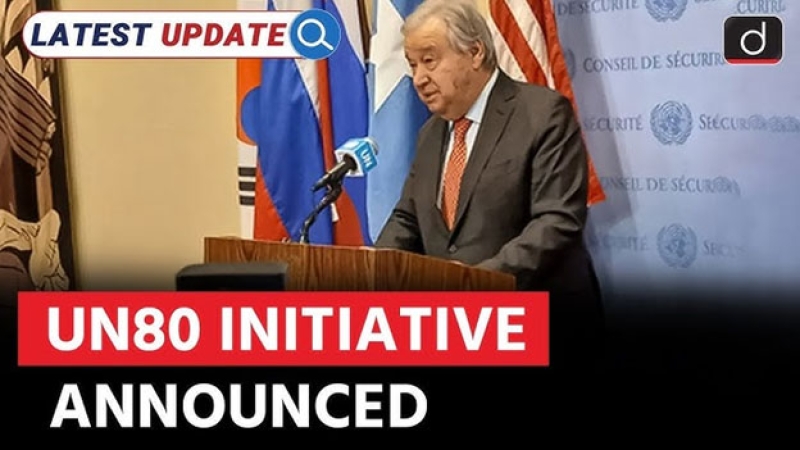- Israel Strikes Tehran with US Support Amid Nuclear Tensions |
- India Sees 9% Drop in Foreign Tourists as Bangladesh Visits Plunge |
- Dhaka Urges Restraint in Pakistan-Afghan War |
- Guterres Urges Action on Safe Migration Pact |
- OpenAI Raises $110B in Amazon-Led Funding |
UN Begins Sweeping Layoffs Under Cost-Cutting UN80 Plan

File photo
The United Nations is preparing to implement one of the most extensive internal restructuring efforts in its history under the banner of the “UN80 Initiative.” This ambitious reform agenda seeks to significantly cut costs by reducing staff, merging departments, and relocating operations from high-cost duty stations such as New York and Geneva to lower-cost cities across the globe. No UN office, department, or agency will be spared from this restructuring drive, according to UN officials.
UN spokesperson Stéphane Dujarric confirmed last week that the cost-cutting exercise will apply across the entire Secretariat, including the Secretary-General’s own office. He added that decisions are currently under review, and further clarification is expected from senior officials in the coming days.
The sweeping review is being guided by a UN Task Force mandated to recommend operational efficiencies and budgetary reductions of 15% to 20% for the 2026 regular budget. These proposals, however, are not yet final. They must be reviewed and approved by the UN’s Fifth Committee (Administrative and Budgetary) and subsequently ratified by the 193-member General Assembly.
While the Secretariat-wide review is underway, some UN agencies have already begun implementing drastic cost-saving measures. The Geneva-based UN refugee agency, UNHCR, announced its own restructuring plans last week in response to what it described as "difficult financial realities."
UN High Commissioner for Refugees Filippo Grandi said that the agency will downsize and streamline its operations to ensure it can focus on the most urgent humanitarian needs. This involves shutting down or reducing numerous global offices, cutting nearly 50 percent of senior positions at its Geneva headquarters and regional bureaus, and discontinuing approximately 3,500 staff positions worldwide. Additionally, hundreds of temporary staff have already departed the organisation due to ongoing budget shortfalls. In total, UNHCR estimates a global reduction of about 30% in staffing costs.
The UNHCR stressed that throughout this process, the priority would remain on supporting refugees in the most critical situations. The agency’s internal review aimed to balance financial necessity with humanitarian responsibility.
In parallel, the United Nations Staff Union (UNSU) in New York issued a memo to all Secretariat staff, cautioning that while restructuring conversations are underway, no decisions have yet been formally endorsed by the General Assembly. The memo urged staff to remain informed but not alarmed, emphasising that current communications are preliminary and meant to prepare for potential changes.
The UNSU leadership, headed by Narda Cupidore, expressed concerns over the speed and scale of the proposed restructuring. The Union questioned the realism of the aggressive timeline, the thoroughness of analysis, the rationale behind the specific quota of job cuts, and the potential impact on productivity and morale. In addition, they warned of inconsistent implementation due to variations in how directives are interpreted under the current Delegation of Authority system.
As part of the broader restructuring, proposed changes include relocating some administrative functions from New York to existing UN hubs in lower-cost countries, consolidating duplicate functions to increase efficiency, and eliminating certain roles entirely. Staff could face reassignments, relocations to different time zones, or the possibility of losing their jobs.
The restructuring has already triggered anxiety among staff, with many expressing concern about their futures and the overall direction of the organisation. Although the UN leadership has pledged transparency and fair treatment during the process, the emotional toll is palpable. The organisation has promised to support affected employees with reassignment, relocation assistance, or severance packages, and plans to host town halls, consultations, and team meetings to maintain open communication.
UNSU has vowed to remain vigilant during this period of uncertainty, promising to represent staff interests at every level. The union will also participate in the upcoming Staff-Management Committee meeting in Kosovo from 23–28 June 2025 and intends to share updates on the outcomes of that dialogue.
As the UN80 initiative advances, a pressing question remains: will the General Assembly approve this sweeping overhaul, or will it heed the concerns raised by staff and unions who fear the erosion of institutional integrity and the undermining of the UN’s global mission?
Whatever the outcome, the coming months will be a critical test of the UN’s ability to reform while upholding its founding values of dignity, transparency, and service to humanity.

